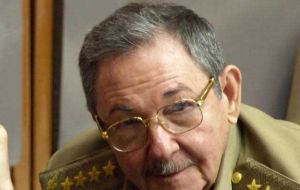MercoPress. South Atlantic News Agency
Castro brothers softly consolidating transition in Cuba
 Fidel's brother Raul Castro
Fidel's brother Raul Castro The younger brother of ailing long time Cuban leader Fidel Castro, acting President Raúl Castro was the top vote-getter in Cuban parliamentary elections, according to official results released Wednesday.
Fidel and Raul easily won re-election to the rubber-stamp legislature known as the National Assembly of Popular Power, as did all of the 614 candidates presented to the island's 8.4 million voters on January 20. However the big signal was that camera shy and far less charismatic, 76-year-old Raúl received 99.4% of votes cast in the family's base of Santiago in eastern Cuba, a percentage point more than Fidel. According to the Cuban regime voting system the unopposed candidates needed to get at least half the votes cast in their districts and none came close to losing. The lowest figure (73%) went to Bárbaro Osmani Lago, from the western province of Pinar del Río. Officials said that 95% of eligible voters went to the polls, though about 4.5% of those turned in blank or invalid ballots. While voting is not mandatory, failing to do so can draw unwanted attention from pro-government neighborhood watch organizations and problems with the rationing card. There was only one choice for each office and organized campaigning was forbidden. While membership of the Communist Party was not required, only party loyalists achieve leadership positions. Although far less prominent than his brother, Raul has long been popular in eastern Cuba, playing up his rural roots and down-home. Some Cubans consider him more pragmatic than his visionary brother. Raul, who is also Defence minister, bested his brother in the 2005 parliamentary vote too, getting 99.75% compared to Fidel's 99.01%. The younger Castro has been governing Cuba since his brother underwent emergency intestinal surgery in July 2006 and provisionally ceded power. Despite his illness, the elder Castro remains head of the Council of State, Cuba's supreme governing body. The new Parliament convenes Feb. 24 and will choose a new council from its members. Fidel has not said whether he wants to remain head of state or retire but there are insistent rumors in Havana that he might bestow more powers on his brother. However in spite of his slow recovery Fidel remains pen active in domestic and world affairs. In an essay published this week he said that US President George W. Bush reached a low point in "demagoguery, lies and total lack of ethics" in Monday's State of the Union address. "For a population that knows how to read, write and think, nobody can offer a more elegant criticism of the (US) empire than Bush himself," wrote Castro. He argued that the US-led war in Afghanistan "was the same thing that the USSR wanted to do, occupy the country with its powerful armed forces that were ultimately defeated when they ran into its customs, religion and cultural differences". He also said Bush used the September 11 terrorist attacks as an excuse to invade Iraq, and that "no one in the world doubts the objective was to occupy (Iraq's) oil installations and has cost that country's people hundreds of thousands of deaths and millions displaced from their homes".




Top Comments
Disclaimer & comment rulesCommenting for this story is now closed.
If you have a Facebook account, become a fan and comment on our Facebook Page!